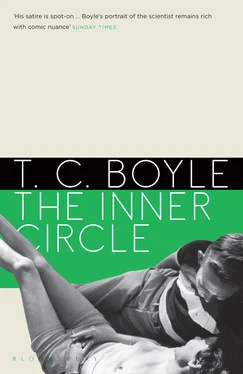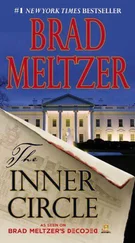There was an unfocused laugh or two in appreciation of Prok’s attempt at humor, and then we drained our glasses, Prok setting his down untouched and immediately looking about him as if he’d misplaced something. I patted at my lips with a napkin, smiled absently at Mrs. Professor Bouchon. She was a bore, of course, but I was nothing if not polite and attentive — that was my nature, and that was my job. But now Prok was motioning me to him even as Corcoran disengaged himself from the Briscoes and began a peculiar shuffle in the direction of my wife (it was almost a dance, and the verb “to sidle” doesn’t begin to do it justice — he was skating, that was what he was doing, skating across the polished floor as if it were the municipal rink).
“Milk,” Prok was saying, “Milk,” as I mumbled something excusatory to the professor’s wife and strode across the room. “And, Corcoran,” he called, causing my future colleague to whirl round on his heels as if he were a human gyroscope Prok had just set spinning, “I’d like to introduce you to John Milk.”
The chatter had started up again, fueled now by the bite of Prok’s rum. I felt it myself — the rum — as a sudden stimulant, as if there were a flap at the back of my head and I’d poured it directly into my brain. At the same moment I caught a glimpse out the window of the denuded persimmon tree, framed over Corcoran’s big smooth head like the standing remnant of some ancient conflagration. Corcoran was smiling. He held out his hand, the happiest man alive, the best-adjusted and most relaxed, an emperor in his own bedroom, and I took it in my own.
“It’s a real pleasure,” Corcoran said, pumping my hand. “Dr. Kinsey’s been singing your praises for two days now. I feel I know you already.”
And there was Prok’s face, creased, jowly, the keen-edged eyes and accipiter’s crest, hanging there between us. Prok was nodding, nodding and approving.
“Yes,” I said, registering the touch of the man’s skin on my own, “me too. I mean, yes, it’s a, well, pleasure.”
“He’s turning into a first-class interviewer,” Prok interjected, turning to Corcoran. “And that is no mean feat, as I expect you’ll come to learn as soon as we can put things on a firm footing.”
I bowed my head at the compliment to show how little I deserved it. Both men were studying me now, as if I were some rare object in a museum. “You’re too kind, Prok, really you are.” I focused on Corcoran. “It’s all in the teaching. And Prok, he’s, well—”
“I’m sure he is,” Corcoran said, giving Prok his soberest look.
“A firm footing,” Prok repeated, all business now. “And I certainly hope you won’t keep us in suspense, Corcoran, because the project requires data, and we do have several other candidates lined up at this juncture, quite capable men, like yourself.” If there had been an air of festivity to this point, Prok had erased it. I could see that he was impatient with the whole process, eager to get on with the musicale — to get it over with, though he treasured these evenings as a way of giving himself over to the emotional side he so rigidly suppressed in his workaday life — and beyond that to get Corcoran hired, trained and out in the field. He looked at us shaking hands and sizing each other up, and he saw nothing more than data, data accumulating at the rate of fifty percent more rapidly.
Mac went round with a tray to collect our glasses, and we took our seats. Prok insisted on ushering Iris and me into the front row beside Mac, and I had a brief moment of panic over the seating arrangements before opting to interpose myself between the two women, who immediately leaned across me and exchanged a birdlike flurry of conversation, not a word of which I caught. Corcoran, as guest of honor, was seated in the front row along with us, taking his place beside Iris. The room quieted. Professor Bouchon’s wife returned from the lavatory and ducked into her seat at the end of the second row, while another woman (middle-aged and doughy, someone I didn’t recognize, or at least didn’t remember) pulled out her knitting and began counting stitches with a mute movement of her lips. There was the fragment of a moment during which Prok turned away to check the gramophone and I was able to lean across my wife and make a hurried introduction—“Iris,” I whispered, “this is Purvis Corcoran; Corcoran, my wife, Iris”—and then Prok started his lecture.
“This evening we have a real treat for you — two versions of Gustav Mahler’s exquisite and powerful Symphony Number Four in G Major, the one conducted by the immortal Leopold Stokowski of the Philadelphia Orchestra (though some of you will no doubt remember him from his early days with the Cincinnati Symphony Orchestra), and the other by his protégé and successor, Eugene Ormandy, the new kid on the block, as it were.” Prok went on, in full lecture mode, to give a brief biography of Mahler, a discography of known recordings, both in the United States and Europe, and then a summary of the contrasting styles of Stokowski and Ormandy. “Now,” he said, his fleshy face and oversized head hanging there before us like a great ripening fruit, legs slightly spread for balance, right hand gesturing, “I intend to play alternate movements, beginning with the Stokowski for the first and third and Ormandy for the second and then the fourth and final movement, but I will then conclude by playing that final movement as well in the Stokowski version. Now, of course, that movement contains the stirring soprano solo, ‘Wir geniessen die himmlischen Freuden’ as sung by”—and here he named two singers I’d never heard of—“but I don’t want you to be distracted by the distinctions in vocal coloration, but rather attune yourselves to the tempo work of the respective conductors, all right?”
There was a vague murmur of assent, which seemed to satisfy him. Prok clasped his hands in front of him briefly, in what might have been prayer, or, more likely, conciliation, then turned away from us to start the record. We heard the needle hit the vinyl surface with a jolt, a blast of static, three distinct pops, and suddenly Mahler was there with us, at full volume.
We lingered for half an hour or so once the concert was concluded (again, the evening was unusual in that Prok generally scheduled an intermission and finished up his program with a few light pieces, but not tonight), and stood around in little groups, sipping coffee and remarking on the music and the clear differences between the two conductors, at least when those differences were made apparent in a demonstration such as this. I had entertained fond hopes of spiriting Iris off somewhere in the Nash, but it was late and there was work in the morning for me and classes for her, so I just stood there stupidly with a coffee cup in one hand and a ladyfinger in the other while Professor and Mrs. Bouchon boxed me into a corner and made appreciative noises about the music we’d just heard. Since I knew nothing about classical music, other than what I’d just picked up from Prok’s remarks, I essentially just stood there listening while Professor Bouchon reminisced about having seen Stokowski in action once — it was in either Philadelphia or New York, he couldn’t be sure which — and his wife pointed out that thanks to the Germans her family’s piano had been destroyed, and all her joy in music along with it.
Across the room, Iris and Corcoran were getting acquainted. Corcoran had somehow managed to talk Prok into bringing out his tray of liqueurs again, now that the time was appropriate, and I watched as he leaned over to pour something the color of urine into her coffee. She hadn’t enjoyed the concert. That much I was sure of. She always claimed that Prok’s clinical dissection of the pieces took all the spirit out of them, and as the years went on she would come to view these musical evenings more and more as a duty than a pleasure. But on this night, as she stood there with Corcoran in the shadow of the far corner, framed by the slick black architecture of Prok’s furniture and the dark stain of the walls, she seemed to be having a high time of it.
Читать дальше












